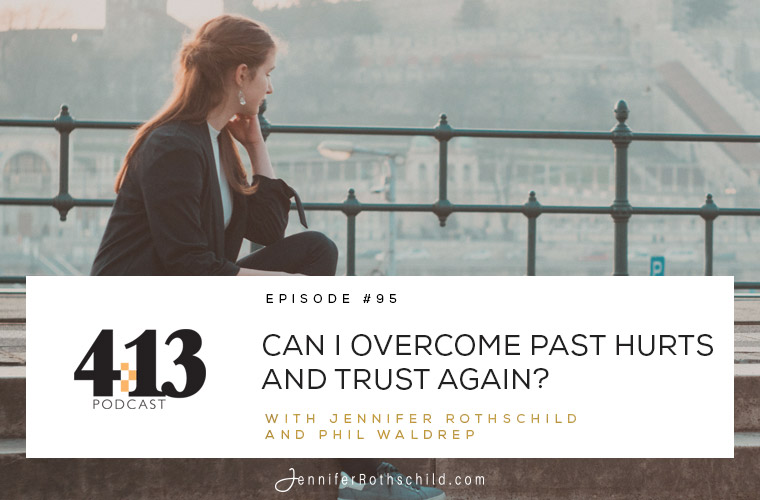
We’ve all felt betrayed at some point in our lives and it sure does hurt. Betrayal has the potential to destroy our trust in people and dismantle our faith in God. It can leave us wounded and feeling powerless to move on. And, often, forgiveness and healing can take a lifetime.
But friend, they don’t have to. On this episode of the 4:13 Podcast, author Phil Waldrep shares his painful experience of betrayal and how he learned to forgive and trust again. And, he gives you eight practical ways to manage and move on if you’ve endured the pain of betrayal.
Phil is the founder and CEO of the wildly popular Women of Joy conferences. He’s also the author of the acclaimed parenting book, Reaching Your Prodigal, and the new book, Beyond Betrayal: Overcome Past Hurts and Begin to Trust Again. He’s married to Debbie, and they live in Alabama … as you’ll hear in his accent!
So, pull up a chair and lean in. This is your day to get off the path of resentment and step into a life of health and wholeness.
How to Overcome Past Hurts and Trust Again
-
- Get honest about your feelings. Phil says that when you go through betrayal, you feel several different emotions at different times. So, the first step you need to take is to understand the emotions you’ll experience.When it comes to emotions, the first is shock because the very nature of betrayal is that you didn’t see it coming. Phil says you’ll try to deny it because you won’t want to believe it. But then reality will hit, and you’ll feel anger. And anger, when not resolved well, turns to bitterness, and bitterness causes you to live your life seeking revenge.
Getting honest about your feelings—what they are and what emotion may come next—helps you then be able to do other things proactively that will help you walk through it.
- Understand that forgiveness doesn’t equal trust. One of the reasons Phil shares that he had trouble forgiving was because he thought forgiveness meant restoring the relationship to the same level of trust that existed before the betrayal. He thought he’d have to get up the next day and act as nothing had happened. But Phil says that’s not what forgiveness means.Friend, in the Bible, you’re told to love, forgive, and be kind to people. You’re also told to trust God. But, you’re not ever commanded to trust people. Trust isn’t something that you engineer; it’s something that’s earned. You give forgiveness to others freely, but they earn your trust by what they do.
- Get honest about your feelings. Phil says that when you go through betrayal, you feel several different emotions at different times. So, the first step you need to take is to understand the emotions you’ll experience.When it comes to emotions, the first is shock because the very nature of betrayal is that you didn’t see it coming. Phil says you’ll try to deny it because you won’t want to believe it. But then reality will hit, and you’ll feel anger. And anger, when not resolved well, turns to bitterness, and bitterness causes you to live your life seeking revenge.
- Realize the betrayal’s not your fault. When we are betrayed, Phil notes that we often feel like there’s something wrong with us. We believe lies such as, “If I had been the wife I should have been, my husband wouldn’t have had an affair,” or “Maybe if I’d been a better business partner, my business partner wouldn’t have stolen the money and run away.”You and I may not be perfect people, and there may be areas of our relationships we can improve on, but the betrayer alone is responsible for their actions. Not you, not anyone else. They make their choice. There are healthy ways to deal with issues in a relationship without betraying another person.
- Trust God to settle the score. Phil shares how Jesus knew from the beginning that Judas would betray Him (John 6:64). But this didn’t stop Jesus from serving people—including Judas. When He washed the disciples’ feet during the Last Supper, this included Judas’ feet (John 13:2-5). Jesus could have said, “Well, if he’s been with me for these three years, seen all the miracles, and is doing this, well, just forget it.” But Jesus didn’t do that. He kept His focus on what God called Him to do, and He kept loving people.Even when you’ve been betrayed, you can still keep serving and loving people too. When you do this, it shows that you ultimately believe God will settle the score now or in the future. It’s not for you to settle. Don’t allow one person’s betrayal to keep you from loving other people.
- Focus on the faithful people in your life. Betrayal shatters our trust, and trust is essential to any relationship. Phil shares how, when trust has been destroyed in one relationship, we start looking at every other relationship and think, “Well, if that person could do it to me, then you might too.” Sometimes this causes us to withdraw and become isolated. But that doesn’t help us heal.One of the super practical things Phil did to work through this was to take out a piece of paper. On the left side, he wrote the names of the people who had betrayed him. On the right side, he wrote the names of those who’d never betrayed him. It was a long list. He determined not to let the names on the left side destroy his relationship with the ones on the right side. You can do the same. Instead of focusing on the person or people who’ve betrayed you, think about those who are faithful to you.
- Find encouragement in Scripture. Phil took the time to read stories about people who were betrayed. Joseph was betrayed by his brothers (Genesis 37:18-28), his employer’s wife (Genesis 39:6-20), and a man in prison (Genesis 40:23). But Joseph kept his eyes on his Heavenly Father, not on those who betrayed him. David, who had lots of betrayals, put his feelings to words in the Psalms.Like Phil, you too can read these stories and be encouraged that you aren’t alone. Others know how it feels. You can also be reminded that betrayal isn’t a surprise to God. It’s part of sin in this sinful world.
- Know that forgiveness is a daily choice. When it came to forgiving the close friend who betrayed him, Phil says he forgave because Scripture commanded him to. And, as he did, he understood that forgiveness was a choice that required him to give up his right to revenge. But it wasn’t a one-time choice; it was a daily choice.For a while, you may have to decide every day to forgive the person who betrayed you. You may have to pray, “Lord, I forgive this person. I no longer seek revenge, even if I have the opportunity. I will leave it in your hands.” It may take you time to reach the place where you don’t have to pray it each day—and that’s okay.
If you’re walking through the pain of betrayal, you aren’t alone. Jesus understands. He’s right there with you. As Phil said, “As you forgive, you’re allowing God’s plan to be the glue that puts all the broken pieces back together.” So, keep trusting Him with the process, my friend.
And remember, whatever you are feeling right now, however you’ve been hurt, healing is yours. You can move on, and you can forgive because you can do all things through Christ who gives you strength.
Related Resources
Learn More About the Take Courage Bible Study
- My newest Bible study, Take Courage: A Study of Haggai is now available. Get a free sample chapter of Take Courage and watch session one free here!
Books and Bible Studies by Jennifer Rothschild
- God Is Just Not Fair: Finding Hope When Life Doesn’t Make Sense
- Missing Pieces: Real Hope When Life Doesn’t Make Sense Bible Study
More from Phil Waldrep
- Visit Phil’s website
- Beyond Betrayal: Overcome Past Hurts and Begin to Trust Again
- Reaching Your Prodigal: What Did I Do Wrong? What Do I Do Now?
- Women of Joy Conference
- Follow Phil on Facebook, Twitter, and Instagram
Stay Connected
- Don’t miss an episode! Subscribe to the 4:13 Podcast here.
- Were you encouraged by this podcast? Reviews help the 4:13 Podcast reach more women with the “I can” message. Click here to leave a review on iTunes.



